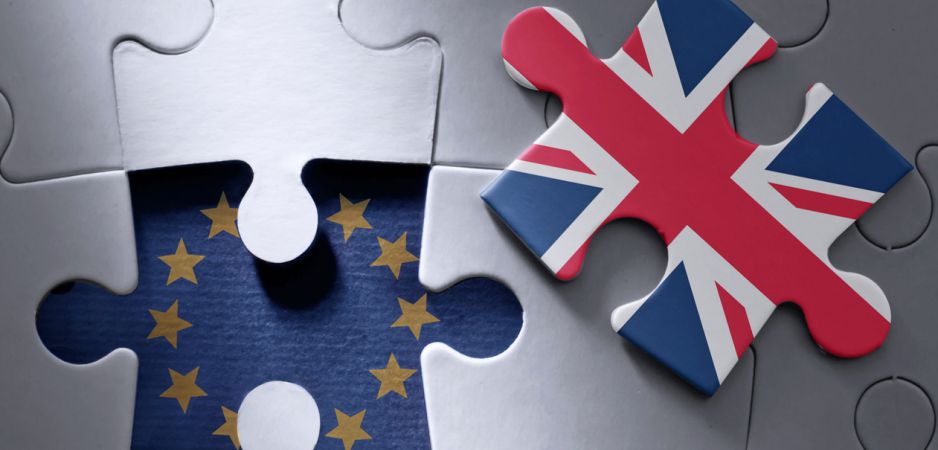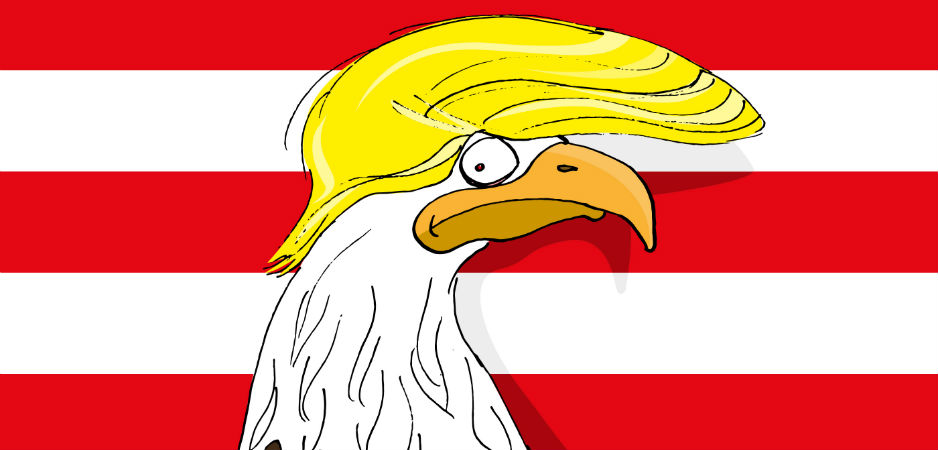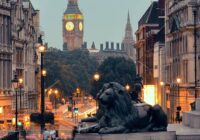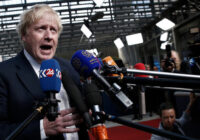Brexit was always going to be tricky, but the High Court has made it trickier with a judgment that forces the British Parliament to decide on the issue.
Just when the pound was plummeting and Brexit was in the air, the wise judges of the High Court threw a googly at British Prime Minister Theresa May. Now, those who have not been civilized by the British will not understand what this author is referring to. A googly is a ball in the once gentlemanly game of cricket that swerves in one direction and unexpectedly turns in another.
Most observers had assumed that the process of Brexit would begin soon. May and her three gallant Brexiteers—Liam Fox, David Davis and Boris Johnson—seemed all set to divorce the European Union (EU). It turns out that they cannot do so until Parliament agrees. The High Court ruled that the government cannot leave the EU without the approval of Parliament.
The legal basis of the court’s decision is exceedingly simple. The United Kingdom’s membership of the EU is bound in the 1972 European Communities Act, and only Parliament has the right to repeal this primary legislation. Because of the UK’s age-old doctrine of parliamentary sovereignty and representative democracy, the referendum on Brexit was merely advisory. Now, May has to get parliamentary approval to trigger Article 50 of the Lisbon Treaty and leave the EU.
Brexit has been a long-running saga in Britain. In the February 21 edition of The World This Week, this author analyzed the UK’s troubled marriage with the EU. Geography and culture link the UK to the continent, but politics has always pulled it to farther shores. Till 1947, the British Empire comprised a fifth of the globe. Richard the Lionheart might have traveled to Jerusalem to battle Salah ad-Din Yusuf ibn Ayyub—better known as Saladin for the pope and Christendom—but, as late as of the 1950s, 90% of letters from abroad came from the British Commonwealth, not mainland Europe.
The UK stayed out of the EU and only joined the club in 1975 at a time of oil shocks, inflation, unemployment, strikes and power cuts. Right from the outset, the EU divided both political parties. Initially, the Conservatives supported joining the EU while Labour opposed it. Later, Labour came around to the idea of life in the EU even as Conservatives turned against it.
The story of the growth of anti-EU sentiment is too well known to bear repeating here. Suffice to say, as Jacques Delors made the EU more dirigiste, Margaret Thatcher turned against the EU with a vengeance. The Iron Lady rejected “a European super-state exercising a new dominance from Brussels” and her acolytes picked up this refrain with aplomb.
When the pound crashed out of the European Exchange Rate in 1992, many expected doom and gloom. Instead, the British economy boomed thereafter. Those who wanted to break free from the vile grasp of bureaucrats in Brussels found their hands strengthened. The Conservative Party found itself in a state of civil war with those wanting to leave the EU eviscerating those who wanted to stay in. Even Labour found itself divided between Tony Blair who wanted to join the euro and Gordon Brown who decided the UK must stay out.
David Cameron became prime minister by smoothing over the cracks created by deep passions over the EU. The slick Etonian was able to waft through his first term in coalition with the Liberal Democrats without confronting Banquo’s ghost, but he found a Hamletian dilemma engulf his government the moment his party got a full majority. Cameron is a witty Old Etonian who cut his teeth in the slick and slimy world of public relations. He elevated running with the hares and hunting with the hounds into an art.
Some would say that this is a classic English trait. Unlike dour Scots, the English are not miserable Presbyterians. Good old Queen Elizabeth II is still the big boss of the Church of England even though no one believes the royals—least of all Prince Harry—have a hotline to God. The English fudge even their relationship to God. This is a land of tradition, of common sense and of the reasonable “man on the Clapham omnibus.”
Not for the English, the Descartian love of logic or the Kantian worship of reason; they are a people suspicious of overarching principles and prefer sound Benthamite judgment on the basis of the facts at hand. Now, sometimes this trait works splendidly well. At other times, the English manage to muddle through. Sometimes this does not quite work though and Cameron is a classic example.
The Economist aptly called Cameron “the accidental Europhile” because he had long played footsie with the euroskeptic wing in his party. In 2013, he rashly promised a Brexit referendum to win the support of this wing to stay on “the top of the greasy pole.” The bloke from the Bullingdon Club declared that “disillusionment” with the EU was “at an all-time high.” Therefore, he asked voters for a fresh mandate so he could negotiate a treaty change that would make the EU “diverse, competitive and democratically accountable.” This relationship would have the single market at its heart and the British people would vote on it in an in-out referendum.
Cameron duly won a second term, decimating both Labour and the Liberal Democrats. Now, without the shield of a coalition to hide under, he had to negotiate “a new settlement” with his European partners as per his rather grand promise. Cameron rocked up in Brussels to negotiate a deal that purportedly gave the UK a “special status” in the EU. Needless to say, as this author pointed out on February 21, he “won concessions far short of his claims.” It turns out that British voters concur.
 In the memorable words of veteran foreign policy guru Glenn Carle, Cameron “was, at best, the sorcerer’s apprentice.” Carle damned Cameron as “a shallow man, who will be known forever in history as the man who destroyed Great Britain, the EU, shook at the very least the foundations of Western civilization, and did so in a benighted effort to obtain political advantage.” He went on to say: “I think only an idiot or a charlatan invites a monster into the house to bring order to the rabble, believing ‘I can control him.’ It is stupid. No one can ever control almost anything, and one certainly should not give opportunities for civilization-wide destruction.”
In the memorable words of veteran foreign policy guru Glenn Carle, Cameron “was, at best, the sorcerer’s apprentice.” Carle damned Cameron as “a shallow man, who will be known forever in history as the man who destroyed Great Britain, the EU, shook at the very least the foundations of Western civilization, and did so in a benighted effort to obtain political advantage.” He went on to say: “I think only an idiot or a charlatan invites a monster into the house to bring order to the rabble, believing ‘I can control him.’ It is stupid. No one can ever control almost anything, and one certainly should not give opportunities for civilization-wide destruction.”
Carle’s apocalyptic vision for the UK and the EU might not turn out to be true. What is certainly true is that Cameron, deemed “mendacious” by one of his former tutors at Oxford, has thrown the UK into the bubbling Brexit cauldron that shows no sign of simmering down.
For Brexit, the High Court decision is an important one. Parliamentary sovereignty is a big deal in the UK. Referendums are a new fashion in this old land. Cameron was hoping to dodge parliamentary debates and party strife by throwing the hot potato of EU membership to the electorate. The court has thrown it right back to the parliament. This leaves May and her Brexiteers with their knickers in a twist.
So, what are the implications of the High Court decision?
First, the decision adds to the legal, political and economic uncertainty in the UK and the EU. May’s government has announced that it will launch an appeal in the Supreme Court. If the court overturns the decision, May and her Brexiteers can stick to their March 2017 deadline to trigger Article 50. On the other hand, if the court upholds the decision, expect a bloody and brutal parliamentary debate.
Both the House of Commons and the House of Lords are full of members who are not jumping up and down in delirious delight at the prospects of quitting the EU. Furthermore, the cold water of the tumbling pound has chilled the raucous enthusiasms of many who were rooting for Brexit. The whole situation is now a right royal mess.
Second, the court judgment indirectly raises a question about the results of referendums that are a close call. As of now, the court has deemed the vote merely advisory. A large number of voters opted to stay in the EU and their number might be growing. Buyer’s remorse seems to be setting in and The Economist has cleverly written about the after-Brexit Bregret. The wily Europhile Blair is calling for a second referendum, which is infuriating the tough as nails May. For now, the court ruling has energized the Europhiles.
Third, the judgment puts into stark focus May’s vision for the UK. So far, May is merely trying to hold her bitter and divided party together. Thankfully for her, Labour has imploded and the Liberal Democrats are enfeebled. This makes her position secure. However, the EU excites primal passions among her Conservative tribesmen. These gentlemen present May with the unwelcome risk of swords unsheathing from their scabbards at the slightest provocation. Meanwhile, Nigel Farage of the United Kingdom Independence Party (UKIP) is playing a stellar role in rattling the tin drum tied to a dog’s tail.
It now seems that the victory for Brexiteers was a result of a protest vote. Voters did not quite like the EU for all sorts of reasons: historic, philosophical, political, cultural and economic. Now that the vote is a fait accompli, they have to decide upon a course for the future. In the June 26 edition of The World This Week, this author pointed out that UKIP’s working class voters and Johnson’s posh patricians want fundamentally different things. The devil lies in the details and support for Brexit might unravel as they appear. In any case, fundamental questions remain unanswered.
Is it going to be the devil-may-care hard Brexit with the UK setting sail into the high seas with the brio and braggadocio of privateers such as Francis Drake and Henry Morgan? In that case, the UK will have to rely on World Trade Organization (WTO) rules alone. The UK would then have to pay tariffs to export its goods and services to the EU. Its exporters would have to deal with the infamous EU bureaucracy even while complying with EU rules in order to sell to continental markets.
Or will it be the so-called “soft Brexit,” whatever that means? Many bandy the example of Norway, Iceland and Lichtenstein as a model for the UK. According to this conjecture, the country could continue to trade on a tariff-free basis with the EU. Of course, it would have make payments into EU budgets. The UK would also have to accept the “four freedoms” of movement of goods, services, capital and people, one of which is anathema to May and her Brexiteers.
In any case, there is no guarantee that the EU will offer the UK the same deal it proffered the tiny countries mentioned above. Negotiations will be long and tough with pressure on French and German politicians not to cave in to the Anglo-Saxons. European politicians are terrified of the EU splitting apart, and this will stiffen the spines of even the most jelly-like mandarins in Brussels.
Finally, Carle is certainly right about Brexit’s impact on Britain itself. If the UK marches out of the EU, what stops Scotland from leaving the UK? Or, for that matter, what stops Northern Ireland from reopening old wounds? Besides, more than 75% of those under 25 voted to stay in the EU. Metropolises like Oxford, Cambridge, Bristol and London made the same choice.
Brexit has left the country divided along class, regional and demographic lines. The UK has been there before and always muddled through. However, it is no longer an empire on the up but a great power in languid decline. Internal strife might not be such a jolly good thing these days.
*[You can receive “The World This Week” directly in your inbox by subscribing to our mailing list. Simply visit Fair Observer and enter your email address in the space provided. Meanwhile, please find below five of our finest articles for the week.]
Halloween Fright: Donald Trump’s Victory Address to the Nation
As America awaits election results, Donald Trump reveals the real reason he ran for president.
New York, November 9, 2016. Suspense reigns as the last polling stations in Hawaii closed hours ago following one of the most bizarre election campaigns in the history of the United States. At this early hour, the entire world is waiting with bated breath for the final count in Ohio, which will give victory to Hillary Clinton or Donald Trump.
The Clinton campaign has yet to make a public statement, but Trump decided to break the silence with a surprise announcement that will undoubtedly resonate across the globe. For the first time since declaring his candidacy in 2015, the Republican candidate clarifies his true motivation in running for president.
The battle is not quite over but let me start off by saying this. We have already achieved our goal. I say that even as they are tallying up the votes in Ohio, the… Read more
Hillary Clinton and the Neocons
Veteran GOP foreign policy hawks are flocking to Hillary Clinton. Is it callow opportunism, or a major realignment?
Much has been made of the swing in political allegiances of neoconservatives in favor of Hillary Clinton. As a group, Washington’s neocons are generally terrified of Donald Trump’s unpredictability and his flirtation with the alt-right. They also support Clinton’s more assertive foreign policy (not to mention her closer relationship to Israel). Perhaps, too, after eight long years in the wilderness, they’re daydreaming of an appointment or two in a Clinton administration.
This group of previously staunch Republicans, who believe in using American military power to promote democracy, build nations and secure US interests abroad, have defected in surprising numbers. Washington Post columnist Robert Kagan, The Wall Street Journal’s Bret Stephens and the Foreign Policy Initiative’s James Kirchick have all endorsed Clinton. Other prominent neocons like The National Review’s William Kristol, The Wall Street Journal’s Max Boot and SAIS’ Eliot Cohen… Read more
Trump Exposes America’s Institutional Breakdown
The future for many in America depends on the lessons learned from this election experience and our willingness to define a better world.
America owes a debt of gratitude to Donald Trump. However, this debt will only matter if Trump’s rise in the Republican Party, Trump’s message and the bile of his ardent supporters becomes a catalyst for long-overdue institutional introspection and reform. If there is one overriding message in the last two and half years of my essays in Hard Left Turn and Fair Observer, it is that America’s political and social institutions are broken, and that the only thing exceptional about America is its collective and self-delusional willingness to believe in its own present greatness.
America is a powerful and dangerous nation, for sure, but a great nation does not allow the breakdown of the institutions that are fundamental to its political existence. Institutional failure has covered over entrenched poverty with rhetoric, allowed guns to overwhelm… Read more
Populism is Straining Regional Relations in North America
Right-wing polarization may disrupt the bilateral relationship between Mexico and the United States.
When Republican presidential candidate Donald Trump visited Mexico on September 1, 2016, local protesters made it clear: His offensive, untrue and divisive rhetoric about the Mexican people was not welcome. Amid that backdrop of rejection on both sides it’s easy to forget that the United States and Mexico have been tied together by economic, cultural, political and geographical bonds for a long time.
Both countries share a 2,000-mile border where hundreds of thousands of people cross both ways legally each day, enabling up to $1.4 billion of annual two-way trade and more than 34 million tourists a year that generate a significant economic spillover on both sides. Both countries share similar challenges along their sprawling border. Despite close collaboration between both governments, estimated billions of dollars in spending on border controls from the US side and thousands of people dying on their attempts to cross… Read more
After Hurricane, Haitian Women Ready to Lead
Hurricane Matthew has devastated Haiti, but women are at the forefront of the recovery.
The devastation in Haiti following Hurricane Matthew is extreme. According to the most recent estimates, the hurricane left more than 1,000 people dead and 2.1 million affected. Around 90% of some areas of southern Haiti are reportedly destroyed, and the lack of clean drinking water has brought with it a deadly cholera outbreak. While international aid, including food, clean water and supplies, is arriving, the lack of coordination to distribute it effectively and efficiently has led to deadly protests.
Although international media has largely shifted its focus, local, grassroots, women-led groups are actively surveying the situation, working quickly to address the immediate needs of women and children, and standing ready to lead recovery and relief. “There is so much damage and destruction—houses, plantations, livestock. Everything has disappeared and many people died,” explain Mikelita Jean and Malia Jean, coordinators of Global Fund for Women… Read more
The views expressed in this article are the author’s own and do not necessarily reflect Fair Observer’s editorial policy.
Photo Credit: CharlieAJA
Support Fair Observer
We rely on your support for our independence, diversity and quality.
For more than 10 years, Fair Observer has been free, fair and independent. No billionaire owns us, no advertisers control us. We are a reader-supported nonprofit. Unlike many other publications, we keep our content free for readers regardless of where they live or whether they can afford to pay. We have no paywalls and no ads.
In the post-truth era of fake news, echo chambers and filter bubbles, we publish a plurality of perspectives from around the world. Anyone can publish with us, but everyone goes through a rigorous editorial process. So, you get fact-checked, well-reasoned content instead of noise.
We publish 2,500+ voices from 90+ countries. We also conduct education and training programs
on subjects ranging from digital media and journalism to writing and critical thinking. This
doesn’t come cheap. Servers, editors, trainers and web developers cost
money.
Please consider supporting us on a regular basis as a recurring donor or a
sustaining member.
Will you support FO’s journalism?
We rely on your support for our independence, diversity and quality.











